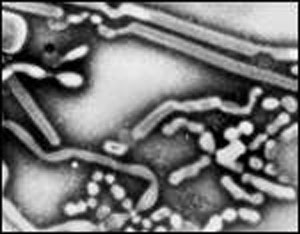
 |
A team of Belgian researchers have found a revolutionary vaccine against flu |
| Sientists from the Walter Friers team from the Ghent and Flanders Universities have developed a vaccine that could produce immunity against the different versions of the Flu virus (also known as Influenza A). The constant variation of the substances that provoke the formation of antibodies against the virus (antigens) is a major health problem in the Western world. |
| Each year researchers need to find a new antidote, able to fight the new strains that the virus has developed. Until now most of the vaccines would try to provoke immunity against two kinds of antigens. Research has been done on the proteins of the "M2" virus which have a structure found unaltered in every strain of the Influenza A virus. |
| The
great advantage of a vaccine based on the "M2" is that it will produce
immunization against all strains. The researchers were able to get the antigen by combining part of the proteins of the "M2" with the main protein of the hepatitis B virus. The test performed on lab animals were highly satisfactory achieving almost complete immunity (between 90 and a hundred percent) against a lethal mutation of the virus. |
| The flu is the main cause of absenteeism in the Western world. This year the department of health of Southern Spain will immunize around 900.000 people against the disease. The 99-2000 campaign will be delivered in 1.700 surgeries and health centres in the region. |
| The Health Service of Southern Spain (SAS) has invested around 1.37 million pounds in the purchase of 735.000 flu vaccines. The health service estimates that 160.000 people will be vaccinated before the end of the present campaign. During the last fall and winter 815.105 people contracted the disease in Southern Spain (an 11.2 percent of the population in the area). |
| The Health Service develops every year a vaccination campaign in order to reduce fatalities within high risk groups. Since the first campaign in 1985, over 12 million people have been immunized in Spain´s Southern region. The main targets are adult and children with chronic lung and cardiovascular illness, chronic patients treated in enclosed facilities, children and youngsters with long term salicylates treatment, the elderly and occasionally health professionals and family members in contact with high risk groups. |
| The composition of the vaccine varies each year, following the recommendations of the World Health Organisation, which maintains a system of epidemiological vigilance. This system uses the information supplied by the Protection against Flu group in Andalusia managed by the Health Service of Southern Spain (SAS). |
| The virus that causes flu is transmitted through infected respiratory secretions found in the air, usually in enclosed places, which originate from coughing and sneezing. After a 48 hour incubation period the most common symptoms are headaches, fever, muscular pain and breathing difficulties. | ||
| World Health Organization | Department of Health | NHS Direct |
| Med Info | BUPA | New Scientist |
| Engilsh Version | Version Francaise | Versión Espanola |